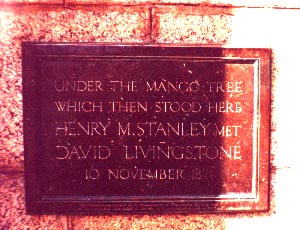Finally I found myself in Tanzania, with the money running out and time-to-work-again approaching. I could hardly believe I'd gone so far. I had reached the country where Henry Morton Stanley found David Livingstone (who actually didn't consider himself lost), and introduced himself with the phrase, "Dr Livingstone, I presume". I decided to go and see the place where they met.
I took the train west to the shore of Lake Tanganyika, to Kigoma. There I checked in to the Railway Hotel (about 1 km from the railway station!) for its fine view over the lake. In the hotel I met 4 Norwegian water treatment engineers who were there on an aid project to look at the town's water supply. I joined them for dinner in the restaurant. When the waiter asked what I'd have to drink, I said just a glass of water. "I wouldn't", said the Norwegian water engineers more or less in unison. They said the hotel's water supply was drawn straight from the lake, at a point between the town's sewage outlet and the nearby jail's sewage outlet. So whichever way the winds and current went, I'd be drinking stuff that hadn't been lake water for very long. I had a beer with dinner.
Over dinner I mentioned Livingstone to the Norwegians. They had heard of him too, but they didn't know that his famous meeting took place just down the road.
Next day I took a bus a few miles down the dirt road, to the village of Ujiji. I was left in the main street wondering where the lake was. Couldn't be far, but no-one could speak English. My Swahili wasn't up to getting directions, and the kids in Ujiji didn't seem to be taught about Livingstone any more. I found an Arab running a clothes shop, sitting outside in the cool shade in an ankle-length white Arab shirt, with his foot-operated Singer sewing machine clanking away, a strange sight in the middle of black Africa. He pointed me to the lakeside. I walked off down the path, wondering how he had come to be there. Were his ancestors among the Arab traders who had given Livingstone hospitality in Ujiji, the reason why he was there to be found by Stanley?
Down at the edge of the lake I found a small granite monument erected
in 1927 by the Royal Geographical Society of Tanganyika Territory, with
a brass plaque to tell me that I had reached the most famous spot in African
exploration. I had started my trip six months before from my home in Scotland,
just a few miles from Livingstone's home in Blantyre; and like him I had
reached Ujiji travelling only by land and sea. I sat down in the shade
of the mango tree to relax and soak in the atmosphere: Lake Tanganyika
a few feet behind me, African women walking up the path with baskets of
fish on their heads, the beat of a drum in the background (a cassette
player I think, but it sounded good). Then along came a tall blond-haired
man. I recognised a Norwegian instantly. He walked up to me and said,
"Dr Livingstone, I presume?" "No, sorry" I replied.
He wasn't quite: he's in Westminster Abbey. But home could have been in Scotland, or it could have been somewhere in Africa, which he never left willingly.
Most white men, and especially most Scots, who have lived and worked in Africa have died there. I haven't.
Yet.
